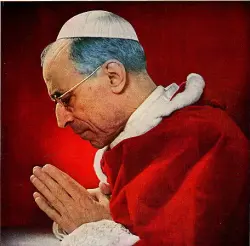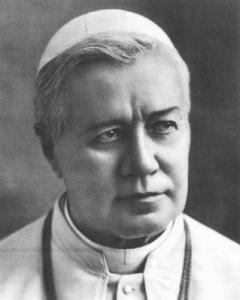Daily Archives: November 10, 2019
The Ruthless Assassin And The Heretical Pope
I will keep this as short as I can because it’s late and I am tired, but I feel that I cannot go to sleep before writing this.
Let us say a man – a known criminal, of sound mind – is seen on the street killing three children in cold blood, in broad daylight, because they did not say “good morning!” to him.
There is no doubt he is an assassin. If the place where he lives has the death penalty (or Capital Punishment, if you want to be theologically exact), there is no reasonable doubt that he deserves it.
Is he, then, on the moment, an assassin? He certainly is. When one kills unjustly, that is, assassinates someone else, he is, ipso facto, an assassin. He is already that, before the need for any sentence.
Can he, therefore, be lynched? Of course not.
Even the obvious fact, already happened, of the assassination – and the fact that this man has, by his act, lost the right to live – must be ascertained and declared in the proper manner, by the proper authority. When this happens, the factual assassin is declared a legal assassin and punished as such. In the factual order, the assassination has already happened, and the assassin has been already such from the moment of the crime. But the declaration of such crime – the one that has consequences on his legals status: say, on his right to be free, or to live in the first place – only happens later. The sentence that states that the man is an assassin has a declaratory effect. It declares as assassin someone who, factually, has been an assassin since the time of the assassination. If he were to never be condemned, he would still die an assassin; but only a factual, not a legal one.
This is not difficult to understand, and it happens every day in various circumstances. If President XYZ (say: Clinton, or Obama) commits an impeachable offence, he is not deprived ipso facto of his rank. However, his offence is such that he can be declared to have committed such an offence and, therefore, can be deprived of his office. But it’s not for you or me to decide that he is not the President of the United States anymore.
You understand where I am going with this.
There can be no reasonable doubt that Francis has apostatised. I think that no reasonable Catholic would disagree with the statement that he has, with his behaviour, violated the First Commandment, like Marcellinus before him.
However, it is not for you or me to decide that he is not Pope, just as it is not for me or you to decide that Bill Clinton’s Presidency ended on a certain day, when he first committed perjury.
We do not know much of the trial that was held against Marcellinus. But one thing we know: he presented himself to the trial as the Pope. We can also have different opinions about the offence committed by Honorius, but it is a fact that he was condemned after his death, and still remained Pope until his death. John XXII, another obvious heretic, also died as Pope. Mind here that John XXIII maintained an obviously heretical (in the common usage of the term; please spare me the discussion) position until very shortly before his death, but was still allowed to remain the Pope and seen by everybody as such.
It is not for us to lynch the assassin, much less to declare Francis deposed. It is, however, for us to cry from the roofs that the man has clearly apostatised, and that he must be declared such – with the consequences of the case – by the relevant tribunal. Which is, obviously, no one of us, but is widely believed to be either an imperfect council called by enough quality bishops to make it qualitatively credible as Catholic, or a declaration by a smaller but, again, credible number of quality Cardinals, able to carry the voice of orthodoxy on their shoulders in a credible way.
It is as simple as that.
Whatever horrible acts Pope Formosus had committed (and to my knowledge the Church ended up, after a number of reverses and counter reverses, confirming his condemnation; but it’s too late to go and check and it is ultimately irrelevant anyway), the fact remains that he died a Pope, as we would say today, “in good standing” and, if memory serves, his acts were not even condemned by his successor, but by a successive pope (Stephanus VI). In fact, Stephanus’ unusual, but very “media effective” decision to have him trialled as a corpse dressed in his papal robes was exactly the confirmation that the one so accused was Pope.
Do not be confused by the apparent contradiction between an apostate pope and a pope in office. The man keeps remaining in office, until it is declared that he has – with acts committed in the past – renounced to it. This is why Pope Formosus was first trialled as Pope, and only after the sentence declaring his deposition had the three fingers of his right hand amputated, symbolising his unworthiness of giving a papal blessing.
This is the only reasonable way to look at it, and it appears (see the examples above) to have been consistently followed in the past.
Stray from this common sense approach, and you will find yourself believing that a quisque de populo can decide who is and who is not Pope. Which can be convenient, or – in these astonishing times – even consoling and, in a very dangerous way, deceptively reassuring; but certainly isn’t Catholic.
Francis needs to be declared an apostate and deposed, just in the same way as the assassin needs to be declared an assassin and, in case, executed. The one and the other could get away with it in this life. The one and the other will not escape the final judgement. God in His Goodness will remedy this situation at the time He has appointed.
For the time being, we remain, decidedly, no Popemakers.



















